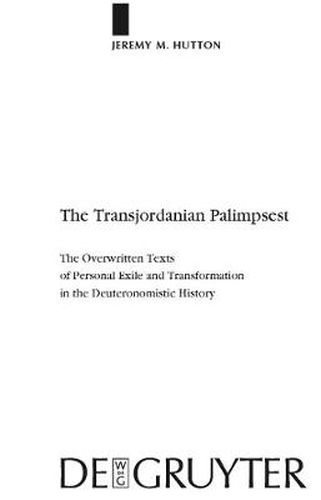Readings Newsletter
Become a Readings Member to make your shopping experience even easier.
Sign in or sign up for free!
You’re not far away from qualifying for FREE standard shipping within Australia
You’ve qualified for FREE standard shipping within Australia
The cart is loading…






This title is printed to order. This book may have been self-published. If so, we cannot guarantee the quality of the content. In the main most books will have gone through the editing process however some may not. We therefore suggest that you be aware of this before ordering this book. If in doubt check either the author or publisher’s details as we are unable to accept any returns unless they are faulty. Please contact us if you have any questions.
This study analyzes several passages in the Former Prophets (2 Sam 19:12-44; 2 Kgs 2:1-18; Judg 8:4-28) from a literary perspective, and argues that the text presents Transjordan as liminal in Israel’s history, a place from which Israel’s leaders return with inaugurated or renewed authority. It then traces the redactional development of Samuel-Kings that led to this literary symbolism, and proposes a hypothesis of continual updating and combination of texts, beginning early in Israel’s monarchy and continuing until the final formation of the Deuteronomistic History. Several source documents may be isolated, including three narratives of Saul’s rise, two distinct histories of David’s rise, and a court history that was subsequently revised with pro-Solomonic additions. These texts had been combined already in a Prophetic Record during the 9th c. B.C.E. (with A. F. Campbell), which was received as an integrated unit by the Deuteronomistic Historian. The symbolic geography of the Jordan River and Transjordan, which even extends into the New Testament, was therefore not the product of a deliberate theological formulation, but rather the accidental by-product of the contingency of textual redaction that had as its main goal the historical presentation of Israel’s life in the land.
$9.00 standard shipping within Australia
FREE standard shipping within Australia for orders over $100.00
Express & International shipping calculated at checkout
This title is printed to order. This book may have been self-published. If so, we cannot guarantee the quality of the content. In the main most books will have gone through the editing process however some may not. We therefore suggest that you be aware of this before ordering this book. If in doubt check either the author or publisher’s details as we are unable to accept any returns unless they are faulty. Please contact us if you have any questions.
This study analyzes several passages in the Former Prophets (2 Sam 19:12-44; 2 Kgs 2:1-18; Judg 8:4-28) from a literary perspective, and argues that the text presents Transjordan as liminal in Israel’s history, a place from which Israel’s leaders return with inaugurated or renewed authority. It then traces the redactional development of Samuel-Kings that led to this literary symbolism, and proposes a hypothesis of continual updating and combination of texts, beginning early in Israel’s monarchy and continuing until the final formation of the Deuteronomistic History. Several source documents may be isolated, including three narratives of Saul’s rise, two distinct histories of David’s rise, and a court history that was subsequently revised with pro-Solomonic additions. These texts had been combined already in a Prophetic Record during the 9th c. B.C.E. (with A. F. Campbell), which was received as an integrated unit by the Deuteronomistic Historian. The symbolic geography of the Jordan River and Transjordan, which even extends into the New Testament, was therefore not the product of a deliberate theological formulation, but rather the accidental by-product of the contingency of textual redaction that had as its main goal the historical presentation of Israel’s life in the land.